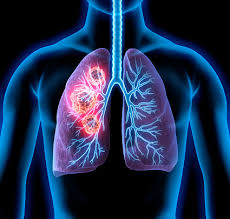Thoracic Cancer

Parts of the Thoracic Region Affected by Cancer
Thyroid cancer is primarily categorized into four different types: Differentiated Undifferentiated Medullary Rare (Squamous, lymphomas, metastatic tumor from esophagus, stomach, lungs and breast. Differentiated is further classified into Papillary, Follicular or Mixed
1. Lung Cancer
The most common thoracic malignancy, often linked to smoking, environmental pollutants, or genetic predisposition. It includes non-small cell lung cancer (NSCLC) and small cell lung cancer (SCLC).
Symptoms:
- Persistent cough or hoarseness
- Coughing up blood
- Shortness of breath or wheezing
- Chest pain
- Unexplained weight loss
- Frequent respiratory infections
2. Esophageal Cancer
- Difficulty or pain while swallowing
- Unexplained weight loss
- Chest or back pain
- Hoarseness or persistent hiccups
- Regurgitation of food
3. Pleural Cancer (Mesothelioma)
- Chest pain
- Persistent dry cough
- Difficulty breathing
- Fatigue
- Unexplained weight loss
- Swelling in the face or arms (in advanced stages)
4. Thymic Cancer
- Persistent cough
- Chest pain
- Breathing difficulty
- Swelling in the face, neck, or upper limbs
- Muscle weakness (linked to myasthenia gravis)
5. Mediastinal Tumors
Cancers that develop in the mediastinum, the central compartment of the chest. They may be benign or malignant and originate from lymphatic, nervous, or glandular tissues.
Symptoms:
- Chest pressure or pain
- Shortness of breath
- Coughing up blood
- Fever or night sweats
- Hoarseness or trouble swallowing
Diagnosis Methods
- Physical Examination & History: Evaluating symptoms and risk factors.
- Chest X-rays and CT Scans: Essential first steps in identifying abnormalities.
- PET-CT Scans: Assess metabolic activity and spread of cancer.
- MRI: For evaluating tumor involvement in nerves and spinal structures.
- Bronchoscopy & Endoscopic Ultrasound: Direct visualization and tissue sampling.
- Biopsy (CT-guided or surgical): Confirming cancer type and aggressiveness.
- Pulmonary Function Tests (PFTs): Assess lung capacity before treatment.
Treatments and Outlook
Treatment is highly individualized based on the cancer type, location, and stage. Our offerings include:- Surgical Oncology: Minimally invasive and robotic surgeries for tumor removal.
- Radiation Therapy: Targeted therapy to shrink or destroy cancer cells.
- Chemotherapy: Systemic treatment to address spread beyond the chest. (Neoadjuvant / Adjuvant.)
- Targeted Therapies: Drugs that attack specific cancer mutations (e.g., EGFR, ALK).
- Immunotherapy: Enhancing the body’s own immune response to fight cancer. Targetted treatments and immunotherapy based on comprehensive gene profiling is the standard of care of modern times.
- Pulmonary rehabilitation
- Nutritional guidance
- Psycho-oncology and counseling
- Palliative care for advanced-stage support
Early Diagnosis and Prevention
Thoracic cancers, especially lung cancer, are more treatable when caught early.
Preventive Measures Include:
Avoiding smoking and secondhand smoke exposure
Reducing occupational and environmental exposure to asbestos and radon
Healthy diet and regular exercise. Since Lung cancer not tobacco related is becoming a very common entity especially females. Women with chronic cough also should be investigated for lung cancer.
Annual low-dose CT screening for high-risk individuals
Timely management of acid reflux (GERD) to reduce esophageal cancer risk
